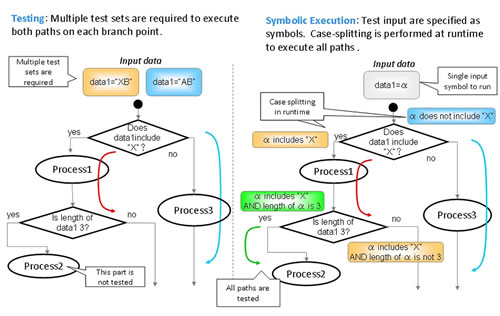Archived content
NOTE: this is an archived page and the content is likely to be out of date.
Fujitsu Develops Technology to Enhance Comprehensive Testing of Java Programs
- Supports text input essential for web applications; NASA to open-source and employ internally -
Fujitsu Laboratories of America Inc.,Fujitsu Laboratories Ltd.
-
[1] Symbolic Java PathFinder
A testing method in which test input data is represented as symbols and during execution the symbols are converted to ranges based on branch conditions, for "case-by-case" execution in which each path is executed.
-
[2] A.M. Turing Award
A prize awarded by the Association for Computing Machinery (ACM), granted to individuals who contribute to innovations in the field of computing. As the most prestigious technical award from ACM, the A.M. Turing Award is given to individuals selected for contributions of a technical nature made to the computing community, with the contributions being of lasting and major technical importance to the computer field.
About Fujitsu Laboratories of America, Inc.
Fujitsu Laboratories of America, Inc. is a wholly owned subsidiary of Fujitsu Laboratories Ltd. (Japan), focusing on research on advanced VLSI CAD, Internet, and interconnect technologies. Conducting research in an open environment, it contributes to the global research community and the working IT industry. It is headquartered in Sunnyvale, CA.
For more information, please see: www.fla.fujitsu.com
About Fujitsu Laboratories
Founded in 1968 as a wholly owned subsidiary of Fujitsu Limited, Fujitsu Laboratories Limited is one of the premier research centers in the world. With a global network of laboratories in Japan, China, the United States and Europe, the organization conducts a wide range of basic and applied research in the areas of Multimedia, Personal Systems, Network, Peripherals, Advanced Materials and Electronic Devices. For more information, please see: http://jp.fujitsu.com/labs/en/
Technical Contacts
Trusted Systems Innovation Group
![]() Phone: +1(408)530-4502
Phone: +1(408)530-4502
![]() E-mail: info@fla.fujitsu.com
E-mail: info@fla.fujitsu.com
Company:Fujitsu Laboratories of America, Inc.
Technical Contacts
Software Innovation Lab.Software and Solutions Lab.
![]() Phone: +81(44)754-2675
Phone: +81(44)754-2675
![]() E-mail: java-verification@ml.labs.fujitsu.com
E-mail: java-verification@ml.labs.fujitsu.com
Company:Fujitsu Laboratories Ltd.
Company and product names mentioned herein are trademarks or registered trademarks of their respective owners. Information provided in this press release is accurate at time of publication and is subject to change without advance notice.
Date: 12 January, 2010
City: Sunnyvale, U.S. and Kawasaki, Japan
Company:
Fujitsu Laboratories of America, Inc.,
Fujitsu Laboratories Ltd.,
,
,
,
